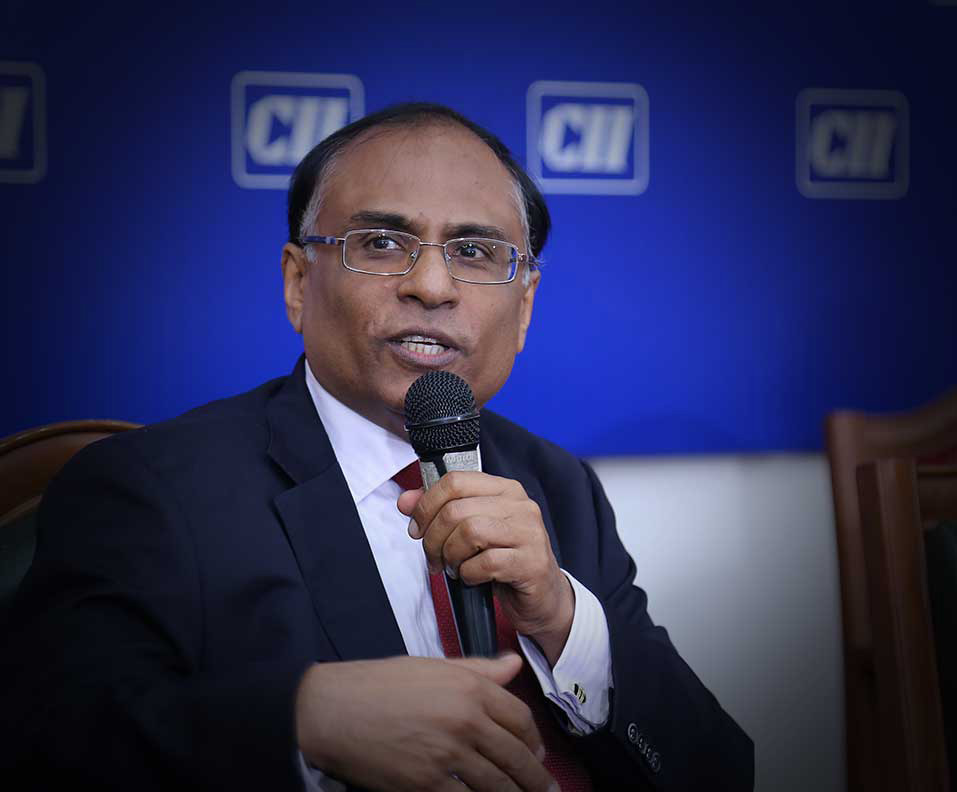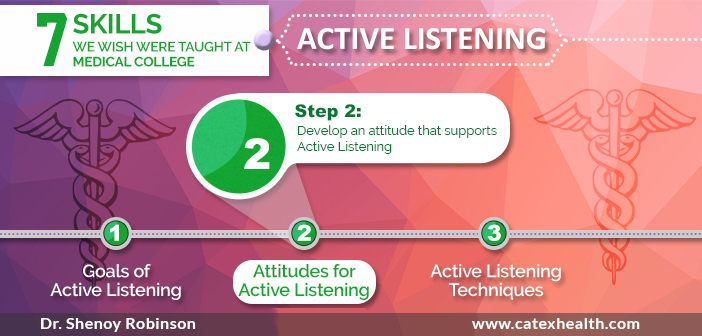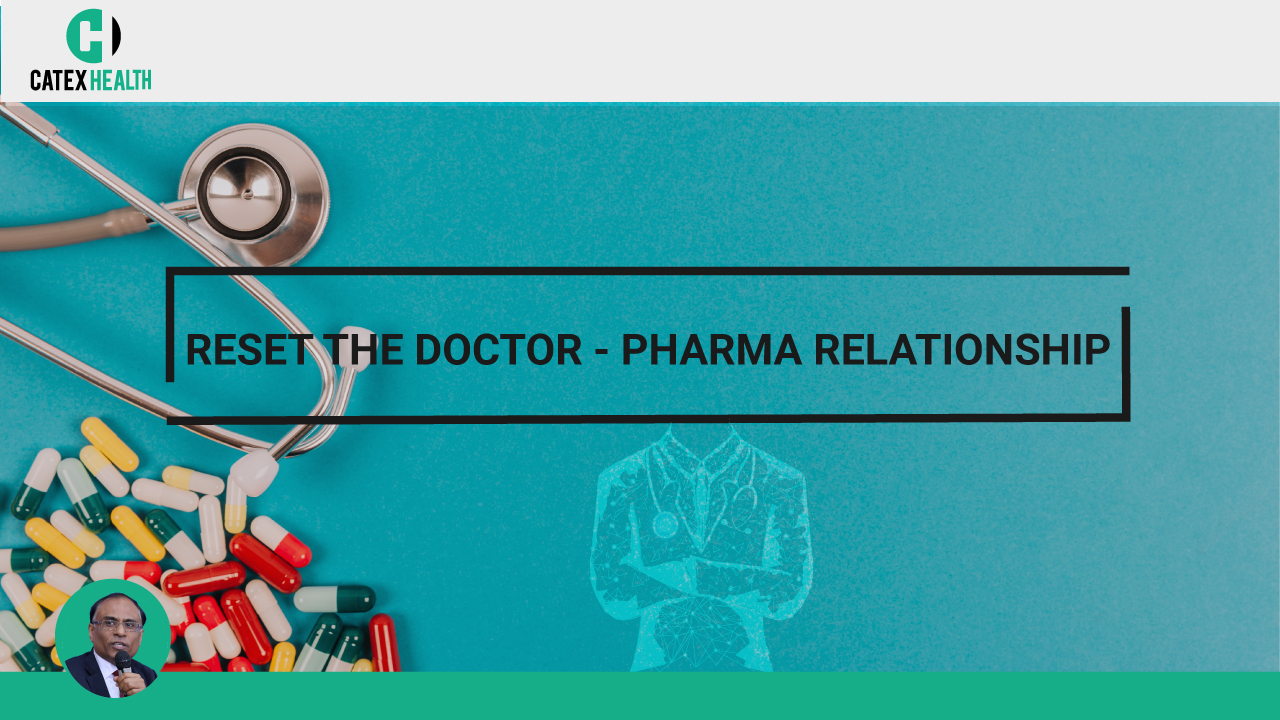Last week, we understood the distinction between listening and hearing. In this article, we focus on the key attitudes required for Active Listening, which is the first skill in the ongoing series on 7 Skills We Wish Were Taught at Medical College
Our ability to be good listeners arises from the attitude that we have while dealing with our patients. An attitude is “a perspective created by a feeling or by thinking about something or someone, which influences our behaviour”. Hence, having the right attitude is a precursor to being an Active Listener. There are a number of attitudes that make us effective listeners, but for the sake of simplicity, I have chosen the following four that I think are most essential:
Attitude 1: Being Understanding and Supportive
I strongly believe that it is not enough for us to know but actually believe that the value of our existence as doctors is totally dependent on patients. This is simply proved by remembering that in case there were no patients, there would be no need for doctors. Hence, a good listening attitude includes behaving in a way that is considerate and respectful to the patient. We need to convey that not only are we interested in the patients’ problems but will do also our best to take care of them. Having someone pay close attention to you and show interest in your problems is always flattering and feels good.
We must remember that the goal of active listening is to accurately identify the core message and core feeling, which cannot be identified by merely sticking to facts. At this point, I would like to call to mind the model of the functioning of the brain that we talked about in 7 Skills We Wish Were Taught at Medical College. I spoke about how our education emphasises on using left lobe functions while feelings lie in the ambit of the right lobe. Hence, I would like to reinforce that by using only the left lobe, we cannot correctly identify core feelings and, therefore, our listening is NOT complete. Doctors fall ill too, and if we were asked which kind of professional we would want for our treatment “a warm caring doctor vis-a-vis a cold clinical factual one” doctors too would invariably pick the former. It is definitely not enough to just follow the history-taking format described in Hutchison’s Clinical Methods!
Attitude 2: Listening for the Whole Message
The next critical attitude is to listen to the whole message and not just the parts that matter to us. Yes, we are always short-pressed for time, there are patients waiting outside the clinic, and we also have a hundred other things to manage. So why would we create the time to listen to all the stories and issues that most patients want to share with us? We interrupt and cut them off in mid-sentence, ask pointed clinical questions that enable us to diagnose accurately, and that’s it. Our fact-based logical left brain tells us that anything beyond that is not required to arrive at a diagnosis. Our medical college training tells us that the purpose of consultation and history taking is to diagnose and treat properly, which is what we are doing, anything beyond that is not required.
However, the patients want more; they want to be listened to, and if we do not take care of this need, we must be prepared for a less-than-satisfied patient. This feeling of not being listened to leads patients to be anxious, fearful and doubtful of the diagnosis, as they are not sure that the doctor has properly understood their problems.
We need to use our right lobes and not rely only on the fact-based logical left lobe.
Attitude 3: Being Non-judgmental
This is a fundamental attitude to support good listening as this conveys that we value and accept all our patients, even if we do not agree with what they have to say or how they say it. We are physicians, and our role does not enable us to pass judgment on our patients. It takes us away from our role of taking care of them.
When we are judgemental, we listen with a filter of our disapproval and bias, and hence, our listening is incomplete and ineffective. We wrongly believe that we can successfully hide behind our professional masks by sticking to just facts, but unfortunately, our behaviour and body language invariably allow our judgemental attitude to dominate, which then blocks our ability to listen effectively. Being judgemental builds a barrier between the patient and ourselves, preventing us from creating an environment of mutual faith and trust. This is not the best foundation for great doctor-patient relationships.
Attitude 4: Developing the Desire to Listen
This is the most essential attitude that we need to be effective and powerful listeners, because without an inner desire, listening can and will not happen. This desire can arise from two motivations “either we are concerned and would like to limit the losses that we have incurred because of not listening, or we want to gain by becoming effective listeners”. In either case, a deep and honest introspection is needed.
The attitudes I have spoken about are not foreign to any of us. However, where we usually falter is neglect to practice all of them or only employ one of them at a time, i.e., we may be non-judgemental but fall short of listening to the entire account of our patients. I am certain that medicine and healthcare would be looked upon by less mistrust if all doctors became active listeners.
Next week, we will discuss Step 3 in Active Listening “Active Listening Techniques“. This is part of a series on “7 Skills We Wish Were Taught at Medical College”.









Nice
good …
Good advice for everyone. Thanks Dr. Robinson.
Thank you Andrew.
Thanks for sharing this article
This Article is Really Good
Thank You